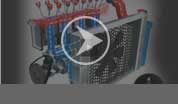Category Archives: Fluids
The Right Fluids for Your Vehicle
Des Moines motorists’ current vehicles have over a century of engineering behind them. They have evolved into complex and powerful machines. Developments in their engines, however, have coincided with advances in many other vehicle components, including the fluids.
It’s vital for Des Moines car owners to always use the right type of fluid for their minivan. Your service advisor and your owner’s manual are resources for auto advice on exactly what types of fluid your vehicle needs. Improper fluids can damage your vehicle and void your warranty.
Some of the fluids that have changed significantly in recent years are cooling system fluid, brake fluid, transmission fluid and motor oil. Each of these comes in many varieties now, and it’s important to know exactly which one your minivan needs.
Cooling systems were once made of iron, steel and rubber. One coolant could be used to protect all of these materials. But new cooling systems have components made from a variety of metal alloys and several kinds of plastic, and coolants now contain additives that protect these various materials from corrosion. Since the materials vary among auto manufacturers, they require different additives, which means there are now a number of coolants on the market. The type of coolant your minivan needs depends on the materials used in its cooling system.
Most vehicles used to require Dot 3 brake fluid. But now many vehicles need Dot 4 or Dot 5. Some Des Moines motorists mistakenly think the higher numbers reflect an increase in grade—that Dot 4 is somehow better than Dot 3. But the truth is, the numbers represent variations in formulation. The different formulas have evolved to meet the demands of newer and better brake systems. For a long time, transmission fluid came in two varieties: regular and friction-modified. But transmissions have come a long way recently, and so have the fluids that protect and lubricate them. There are several new types of fluid on the market, but your minivan is designed for just one of them.
Of all the automotive fluids, motor oils have experienced perhaps the greatest advances in engineering and technology. A number of new weights and formulations have recently been developed to meet the needs of modern engines, which have more parts and tighter tolerances than ever before. Engines have become more sophisticated and complicated, but they have also increased in power and fuel efficiency. Despite these changes, Des Moines car owners still need them to be highly durable.
That’s the job of motor oil. Motor oil still has to perform its original, critical function—lubricating and protecting the engine. It is formulated to help clean the engine as well. Modern motor oil also has to be thin enough to penetrate small engine passages yet still be resistant to vaporization.
Specialized motor oils have also been developed for high-mileage vehicles. If your minivan has 75,000 miles or more on it, you might consider switching to one of these motor oils. They contain extra detergents that help clean older engines and essential additives that condition seals and gaskets that can become brittle with age. High-mileage motor oils come in weights and types just like regular motor oils, and Des Moines motorists should match the proper weight and type of high-mileage oil to their vehicle in the same way you would regular motor oil.
Over time, vehicles have developed in complexity and variety, and their fluids have developed as well. Each vehicle is matched to a set of fluids that meet its specific requirements. IA vehicle owners should take care to learn their minivan’s fluid requirements before topping off at home. A large part of preventive maintenance for Des Moines drivers is making sure your vehicle’s fluids are clean and adequate, but they must be the proper type as well. As our minivans become more sophisticated, car care becomes more sophisticated as well.
Learning about proper fluids for your vehicle will help you maintain its performance and prolong its life. Talk to us at Des Moine BDG in Des Moines.
Automobile Fluids For Your minivan
If you’ve walked through the automotive fluids of an auto parts store in Altoona, you’ll know how overwhelming the sheer number of products available can be. How do you know what’s right for your vehicle?
As you know, these fluids all serve a function in making your car run as you drive around the Altoona area. Your vehicle manufacturer has specified a particular type of fluid for every system from the motor, to the cooling system, brake fluid and so on. When you realize that not every variation is applicable to your vehicle, the task becomes more manageable.
First let’s talk about why there are so many varieties. Starting with motor oil, we see that manufacturers match the properties of a particular weight or type of oil with the design needs of the engine. For example, engines with sophisticated valve trains often require a thinner weight of oil.
Some vehicles around Altoona come from the factory filled with synthetic oil and the recommendation to use it for life. The safe bet is to always use what the factory recommends. The recommendation is what’s been proven to work in function and durability tests. The recommended oil is also a factor in determining oil change interval schedules.
 A good quality oil has more additives that are engineered to clean and protect the engine. They cost a bit more, but are worth the extra protection. If you buy budget oil, you might want to consider shortening your oil change interval.
A good quality oil has more additives that are engineered to clean and protect the engine. They cost a bit more, but are worth the extra protection. If you buy budget oil, you might want to consider shortening your oil change interval.
Sometimes fluids are developed specifically to meet the needs of a particular family of engines. An example would be coolant. Because of the different materials used to build the cooling system, the coolant has to be formulated to protect those parts, which vary from manufacturer to manufacturer, from corrosion. We’ve seen special coolant in Altoona for General Motors, Volkswagen, Chrysler and others.
The same is true of transmission fluid and brake fluid in recent years.
The really good news is that your Altoona service center has databases that tell them the recommended fluids for your vehicle. This takes all the guess work out. If you have some special needs, like a higher mileage engine or want enhanced performance, ask your service advisor for upgrades or additives that’ll meet your needs while being consistent with the manufacturer’s recommendations.
Of course, your full-service oil change will top off your fluids. But it’s a good idea to have some of everything at home in case you need to top something off yourself or to take on a trip. Ask your Altoona service advisor at Des Moine BDG or check your owner’s manual for fluid specifications.
It’s important to know that there are national warranty laws that say that a manufacturer cannot require you to use their brand of fluid to maintain your warranty. That said, there are two things that may affect your warranty.
Using the wrong type of fluid may void the warranty. Going back to radiator coolant, the correct type protects against corrosion and the wrong type will not. So it’s important to be right.
Also some warranty protections are conditioned on taking care of scheduled preventive maintenance. Please review your warranty if you have questions.
How to Know When to Change Your Oil At Des Moine BDG
Today in the Des Moine BDG auto care blog, we’re going to talk about oil change intervals. It seems that as engine technology advances, recommended oil change intervals have gotten longer for Des Moine BDG customers. High quality oil in a well-engineered minivan engine has lead to extended intervals. But it’s also lead to some confusion among Des Moines drivers.
The old mantra “change your oil every three months or three thousand miles, whichever comes first” once applied to every vehicle on Des Moines highways. Time and miles take their toll on motor oil. But now, you could have a different oil change recommendation for every car or truck you own.
Des Moines motorists are like everybody else, they have a tendency to follow the oil change schedule of the vehicle with the longest interval. Of course, that can lead to problems.  For example, recently four of the world’s largest auto makers shortened the published intervals for several of their engine models. They originally published intervals that extended out to a much as 8,000 miles.
For example, recently four of the world’s largest auto makers shortened the published intervals for several of their engine models. They originally published intervals that extended out to a much as 8,000 miles.
In real world Des Moines driving, the oil started to sludge up before the recommended change interval. Oil sludge is a thick jelly-like substance. Quite literally petroleum jelly – like Vaseline. This goop was clogging minivan small engine passages so the oil wouldn’t flow to some parts of the engine. This resulted in engine damage. We see it too often at Des Moine BDG in Des Moines.
The manufacturers began to offer an extended warranty to cover sludge damage. But there was a catch: the vehicle owner had to follow a new, lower service interval, and provide proof of oil changes in order to make a warranty claim.
So here’s the bottom line: with longer oil change intervals, it’s essential to follow them closely. Back in the day of 3 months or 3,000 miles, if you went an extra month or an extra thousand miles, your oil was still fresh enough that it didn’t have time to build up much sludge.
But if your recommended interval is 6,500 miles and you go over another thousand, you’re getting into heavy sludge territory. You absolutely need to follow mileage intervals very closely. And don’t forget your severe service schedule. If you do a lot of stop and go driving in IA, short trips, drive in dusty or polluted Des Moines conditions, hot or cold weather, or haul heavy loads, you’re driving in severe service conditions. Your Des Moine BDG advisor can help you determine which schedule to follow.
So check your minivan owner’s manual or talk with your Des Moine BDG service advisor about where and how you drive in Des Moines. Should you change your oil closer to the regular schedule, or the severe service schedule? You need to make the call.
Let me give you an example of this. Some newer minivans have an oil change indicator. It has a sophisticated computer algorithm that tracks number of cold starts, engine temperature, RPMs, mileage, and many more variables to come up with a recommendation for when to change the oil.
Depending on driving conditions, the indicator in one test vehicle came on at anywhere from 2,500 miles to almost 7,000 miles. It’s typically just over 4,000 miles. Clearer sometimes, we’re driving easy miles that are easy on the minivan – like a long road trip. Sometimes, we’re driving hard IA miles – like towing a heavy trailer or a lot of around town driving. But, usually, it’s a combination of both.
Once again, it’s up to you to make the call as to when to change your oil at Des Moine BDG to protect your minivan engine. Another place where IA drivers can go wrong is with the type of oil they use. More and more new cars are coming to Des Moines owners filled with synthetic oil. Without going into a lot of detail right now, let’s just say that synthetic oil lasts longer and is very resistant to oil sludge.
But it also costs quite a bit more, so some Des Moines people are tempted to use conventional oil for their oil changes. Now, it’s always best to use the oil recommended by your manufacturer. Check your owner’s manual see if a conventional oil alternative is allowed.
But getting back to the problem, if your minivan came from the factory with synthetic oil, the recommended oil change interval is for synthetic oil. If you use conventional oil, you can’t use the synthetic interval. You need to shorten it.
Proper Fluids for Your Vehicle
The automotive professionals at Des Moine BDG would like to give Des Moines drivers an update on some of the things happening in automotive fluids. You know, cars are becoming more sophisticated everyday – and fluids such as, oil, coolant and transmission fluid are becoming more specialized at about the same pace.
The Altoona do-it-yourselfer has to be pretty careful so that they do not actually harm their vehicle with the wrong type of fluid. That is why so many IA car owners rely on the advice of their helpful Des Moine BDG technician to not only get the correct family of fluids, but to suggest the formulation that is best for their car and their driving habits.
Let’s start with engine oil. Ankeny drivers who have been paying attention, will have noticed a number of new oil weights on the IA scene in the last several years. Modern engines are built to much tighter tolerances and have very complicated valve trains. The oil must be thin enough to lubricate complicated parts when the engine is cold. The weight of an oil is expressed in terms like 20-W-50 or 5-W-30. The car makers recommend the weight of oil for each vehicle they make. The recommendation is based on engine design. Your Des Moines service center will know what weight your manufacturer recommends – and it’s important to follow those recommendations. Your technician at Des Moine BDG can also offer suggestions for special formulations and can tell you all about conventional and synthetic oils.
Antifreeze, or engine coolant, is another area that has become more complicated. For a long time, manufacturers only recommended a couple of different types of coolant. Now, several different formulations are needed because of the high-tech materials that car makers are using to build the cooling system. Using the wrong type of coolant can actually void your warranty, so you want to get that right.
Transmission fluid is becoming specialized as well. New transmission designs have particular requirements that require specific formulations. Recently, new, somewhat confusing, standards for brake fluid have also been released.
Not too long ago, there was a good chance that all of the vehicles at your Des Moines house would use many of the same fluids. However, as automotive technology advances, the array of basic automotive fluids you need will grow. And, some of the formulations will cost a little more. Fortunately, Des Moine BDG will continue to update their training to keep pace with technology so that you’ll get the right fluids your car needs. It’s all part of the commitment we make to your driving peace of mind.







